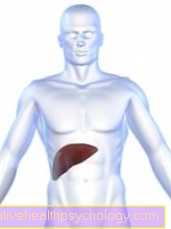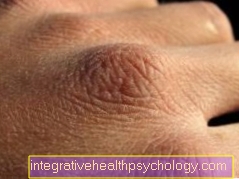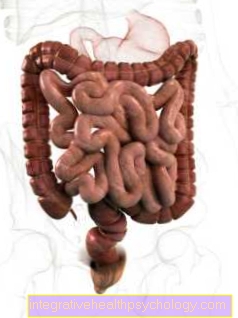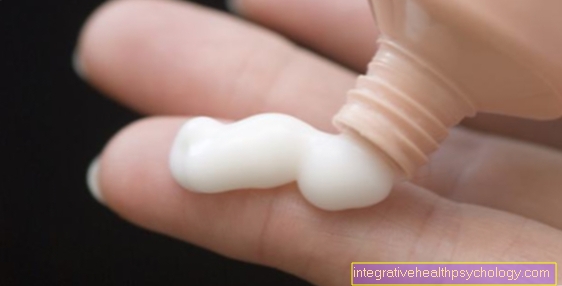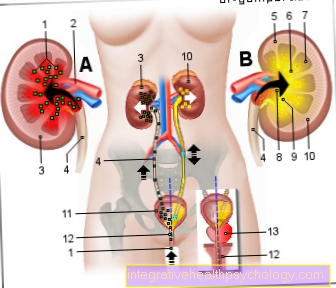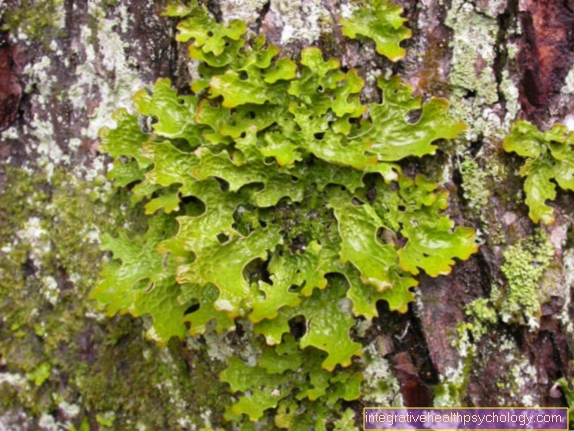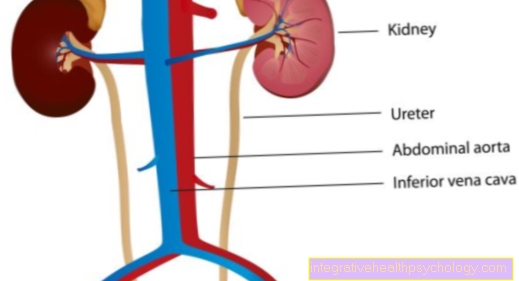Aphthae - What Causes Small Blisters In The Mouth?
General
A sudden uncomfortable feeling in the mouth, especially when you are eating or even when you are talking.
If you take a closer look in the mirror, you can see a small white vesicle in the oral cavity, which is on the mucous membrane. If you touch it with your finger, this unpleasant pain jerks through you again. It is most likely a canker sore that usually does not appear for the first time.
But what are the causes of canker sores and what can be done about it?
Read more on the topic: Aphthae - painful blisters in the mouth and throat
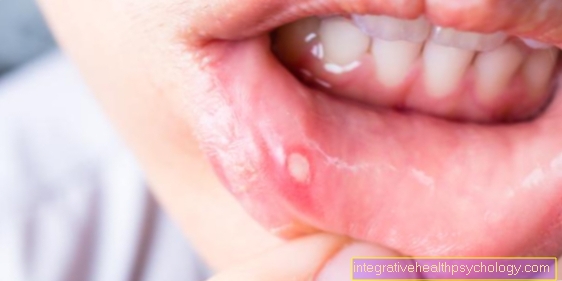
Illustration of canker sores
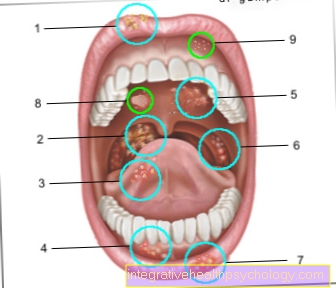
The most common areas
(blue circles)
- Herpes -
Herpes simplex - Oral mucosa -
Tunica mucosa oris - Tongue -
Lingua - Gums -
Gingiva - Palate -
Palatum - Palatine almond -
Palatine tonsil - Lip -
Labium oris
Examples of large and small canker sores -
(green circles) - Large canker sores - Major form
- Small canker sores - Minor form
You can find an overview of all Dr-Gumpert images at: medical illustrations
Causes of canker sores
The exact cause of canker sores is not yet known. However, one assumes various factors that favor the development, as well as a genetic predisposition.
So far it is known that gluten is a possible cause of canker sores in people who suffer from gluten intolerance.
Furthermore, a deficiency in vitamin B12, iron or folic acid promotes the development.
Read more on the topic: Vitamin B12 deficiency
A changed hormonal balance is also associated with the development. Especially during pregnancy, the menopause and in connection with the menstrual cycle, an increased incidence of canker sores is evident.
Women suffer from canker sores more often than men.
In addition, after various studies it was found that certain foods can also be influenced. These include walnuts and hazelnuts (also as a component of chocolate), citrus fruits, tomatoes, very spicy dishes and alcoholic beverages.
An increased development of canker sores has been demonstrated in smokers, which may be related to the deposits that build up on the oral mucosa during smoking. There is increased cornification of the epithelium.
Another important component is a strong immune system, because a weakened one increases the risk of developing a sore throat.
With a weakened immune system, the body does not have as much energy available to fight off pathogens, so that they have an easier time causing inflammation. HIV should also be mentioned in this context.
HIV patients show an increased susceptibility to canker sores, which can be attributed to the fact that HIV patients have a weakened immune system due to the virus.
But other systemic diseases such as chronic intestinal diseases or Behcet's disease can also trigger the canker sores. Behcet's disease is a multi-system disease that affects the blood vessels. Herpes and flu viruses are also associated with the formation of canker sores.
Conversely, frequent canker sores can also be a sign of an illness.
A stressful everyday life and mental suffering can affect the organism and, among other things, contribute to the formation of canker sores.
Aphthae are often said to be contagious, but this is incorrect. The cause lies with the person concerned and cannot be passed on. Only possible causes, such as viral infections, can be transmitted. The blister in the mouth doesn't always have to be an ulcer.
Read more about this: Vesicles in the mouth
HIV as a cause of canker sores
HIV is not the direct cause of canker sores, but it can be the reason why they appear more frequently.
An HIV-positive patient has a weakened immune system after several years, which means that small wounds and the resulting inflammations in the mouth are not so easily fought by the immune system. In many cases, canker sores are seen as a sign of a recent HIV infection. However, since the immune system weakness only manifests itself after several years, there is not always concern about an acute infection.
Affected patients have recurring large canker sores, in several places at the same time.
Read more on the topic: Symptoms of HIV
Toothpaste as the cause
The fact that ingredients in some toothpastes could be a possible cause of canker sores is still controversial.
It is sodium lauryl sulfate, a detergent, i.e. an active washing substance that is also contained in detergents.
Its function is to loosen proteins and thus to bind and remove the “dirt”. It should also have an antibacterial and antiviral effect.
However, the ingredient, which is not found in all toothpastes, has been criticized as it is said to have an allergy-causing and skin-irritating effect. Of course, these properties favor the development of canker sores.
Vitamin deficiency
As explained in the Causes section, a weakened immune system can lead to increased canker sores.
This immune deficiency can, among other things, result from a lack of vitamin intake.
In the case of the oral mucosa, the main problem is folic acid or vitamin B12 deficiency. In addition, an insufficient iron balance favors the development of canker sores, which also explains why women are more often affected than men. If canker sores occur more frequently, a blood test should be carried out to precisely determine the vitamin balance.
Read more on the topic: Vitamin B12 deficiency
allergy
The oral mucosa is very resistant to normal skin, which means that it only reacts “later” than the skin of the body. This can be observed especially in children who, for example, have a nut allergy. A rash in the elbow occurs faster than an ulcer in the mouth. Nevertheless, the oral mucosa can react with inflammation in the case of severe allergies.
For example, gluten is a trigger in patients with proven celiac disease (gluten intolerance). In addition, connections between canker sores and food intolerance have often been observed. These are, for example, walnuts, hazelnuts, tomatoes or citrus fruits.
The body's reaction by means of canker sores or similar inflammations are a kind of defense mechanism: If something is not tolerated in the mouth, it should certainly not get further into the gastrointestinal tract and cause more serious problems there.
Please also read: Testing for a food allergy
Treatment of canker sores
In most cases, canker sores heal on their own within two weeks, so that medication is not absolutely necessary.
There is no direct remedy for the appearance of canker sores, but there are various possibilities to support the healing process and to alleviate the pain.
Read more on the topic: Treatment of canker sores
Various preparations can be purchased in the pharmacy, which are sold as spray, ointment, liquid or gel.
Most of these contain lidocaine, a local anesthetic that numbs the inflamed area for a short time. Read the article: Dynexan® oral gel.
Hydrogen peroxide can also be used, but its use should be discussed with a doctor.
This treatment has the effect that all germs present in the oral cavity are killed. However, this procedure should not be used too often as it has an irritating effect on the oral mucosa.
Rhubarb roots, silver nitrate solutions and tinctures of myrrh are used as remedies, as is aloe vera. It is particularly easy to apply in gel form.
Some medical professionals recommend the use of minocycline or tetracycline, which suggests bacterial infection as the cause of canker sores.
These drugs are prescribed by the doctor in tablet form and usually have to be dissolved in water, with which the oral cavity is then rinsed and the liquid is then spat out again.
An ointment containing triamcinolone will relieve pain and inflammation. The ointment covers the canker sores like a kind of protective blanket, so that they no longer come into direct contact with other substances.
Since a deficiency in vitamin B can also be involved in the development of canker sores, taking it can accelerate and support the healing process. Zinc and vitamin C are also suitable.
Of course, there are also a number of home remedies that promote healing and are perfectly adequate in most cases. So you can cook a strong chamomile or sage tea, with which you rinse your mouth several times a day. It has a calming, anti-inflammatory effect and sage is primarily said to have an antibacterial effect.
Alternatively, you can dip a cotton swab into the tea and dab the canker sores with it.
Read more on the topic: Aphthae - which home remedies can help?
To relieve the pain, honey can also be mixed with a little turmeric and applied to the area. The dentist has the option of treating the canker sores with the help of a laser. Even if alcohol is said to have a disinfectant effect, it is more likely to be involved in the development of canker sores and should not be used to combat.
In addition to the treatment options shown, homeopathic remedies are also often used.
Read more on the topic: Homeopathy for canker sores
prophylaxis
Aphthae are not uncommon and affect everyone at least once. In almost 90% of the cases, however, it is only very small canker sores that are harmless and will go away on their own, even if the pain is felt to be very unpleasant for a certain time. If left untreated, they disappear after a maximum of two weeks; if the healing is supported, this happens even faster, so that the canker sores can be a thing of the past after a few days.
There are no measures to protect yourself directly against canker sores, as the origin has not yet been fully clarified. However, a healthy diet, adequate intake of vitamins, avoidance of stress and caring for the oral cavity are good and sufficient measures to keep the possibility of canker sores very low.



